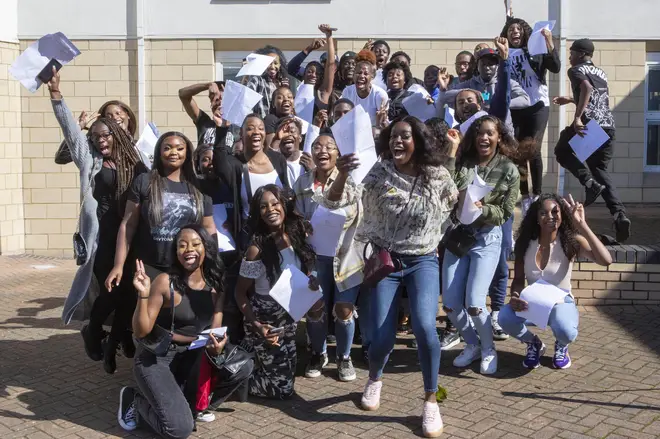
Iain Dale 10am - 1pm
10 August 2021, 00:02 | Updated: 11 August 2021, 05:24

A record proportion of students have received top grades on A-level results day, with nearly 45 per cent being awarded an A or A*.
The proportion of candidates who received either of those scores last year was less than 39 per cent.
It comes as hundreds of thousands of students woke up to their A-level results on Tuesday morning.
This year's grades, like in 2020, were determined by teachers after the summer's exams were cancelled.
Read more: Row over £9,250 tuition fees for 'blended learning' courses
Explained: When will you get grades? And how to appeal or go through clearing

Students celebrate after receiving A-level results
Nearly one in five entrants received an A* - another record high, which is up from around one in seven last year.
However, the overall pass rate (grades A* to E) was 99.5 per cent, which is down very slightly from 99.7 per cent in 2020.
Meanwhile, girls have extended their lead over boys in the top grades, with the proportion of female students who got A or higher at 46.9 per cent - nearly five percentage points higher than boys. Last year, girls led boys by 3.2 percentage points.
A record 395,770 students have been accepted on their first choice full-time undergraduate course in the UK, up eight per cent from 365,500 in 2020.
Read more: Too many people are going to university, education charity chief says
Read more: Student fury as universities plan to continue online teaching into 2022

University boss urges students not to panic about results
After exams were cancelled for the second year in a row, grades were submitted by teachers in England based on a range of evidence, including mock exams, coursework and in-class assessments using questions by exam boards.
Some experts predicted that "inflation" may occur this year, with the possibility that top universities may find it more difficult to differentiate between applicants if more students gain top grades.
Youngsters who miss out on the grades needed to meet their university offers are likely to face greater competition for a place at leading institutions as there could also be fewer courses on offer in clearing.
Unions representing school leaders and teachers have urged parents and students against using law firms to challenge their results.
Dr Mary Bousted, joint general secretary of the National Education Union (NEU), said: "Parents should be really warned not to hire lawyers to make the case for a different grade because it will impress no one, it won't impress the exam boards."

Paul Whiteman, general secretary of school leaders' union NAHT, said: "Although the appeal system is there to bring a further level of confidence, spurious appeals or hopeful appeals will probably be a waste of time because the system that's been brought in is a robust system for this year."
He added: "A lot of work has gone into this assessment... so simply putting an appeal in for the sake of appealing in the hope that your grade might move would be the wrong thing to do."
Geoff Barton, general secretary of the Association of School and College Leaders (ASCL), said "legal firms turning themselves into ambulance chasers and saying to parents for a certain fee they will run an appeal" was unhelpful.
He said: "Appeals are there for anyone who wants to use them, but they're based on two things: did the school follow due process, and was the grade awarded a fair grade. That will be down to the awarding organisation.
"If you've got a concern then the process is there, but you really don't need to be sending money to lawyers."

Sixth Form Principal proud of students' huge resilience
The Department for Education has said all A-level grades have been checked by schools as part of a quality assurance process - and one in five schools had a sample of their grades checked by exam boards.
Last summer, the fiasco around grading led to thousands of A-level students having their results downgraded from school estimates by a controversial algorithm before Ofqual announced a U-turn.
This year there was not an algorithm used to moderate grades.
Nick Hillman, director of the Higher Education Policy Institute (Hepi), said it could be more difficult to get on to a top course this year if grades are missed.
He said: "It could be harder to get in than usual if you fall a grade or two behind your offer and if it is a competitive course.
"My advice would be to act swiftly if you need to find a place somewhere else."

Analysis suggested, as of Monday afternoon, 14 of the 24 Russell Group universities had vacancies on courses for English residents - around 2,390 courses between them - on the Ucas clearing site.
At the same point last year, the day before results day, 17 of the Russell Group institutions had around 4,485 undergraduate courses listed on clearing with potential availability for students in England.
Last week, the head of the admissions service warned clearing is likely to be "more competitive" for students seeking places at selective universities this year.
Clare Marchant, Ucas's chief executive, urged students receiving their grades to make a decision "in a matter of days" rather than waiting weeks.
But she added: "On Tuesday, I am expecting to wake up and have record numbers with their first choice."

Kate Green, Labour's shadow education secretary, said: "Students have worked incredibly hard in extraordinary circumstances and should be proud of the results they are receiving today.
"They have done this in spite of a Conservative government which has let them down at every turn and shown no ambition for their futures."
Education Secretary Gavin Williamson said: "Students have worked very hard in what has been an extraordinary and challenging year, and each and every one of them should feel incredibly proud of their achievements. We should all celebrate their resilience and ability to overcome adversity.
"Teachers and staff have ensured that, despite the disruption caused by the pandemic, all students are able to get grades this year and so can take their next steps and make their choices about further study or entering the workplace."